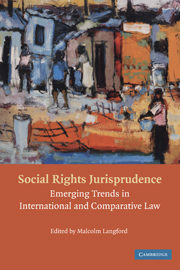Book contents
- Frontmatter
- Contents
- Foreword – Philip Alston
- Preface
- PART ONE OVERVIEW
- PART TWO SELECT NATIONAL JURISDICTIONS
- PART THREE REGIONAL PROCEDURES AND JURISPRUDENCE
- PART FOUR INTERNATIONAL HUMAN RIGHTS PROCEDURES AND JURISPRUDENCE
- PART FIVE SPECIAL TOPICS
- 28 The International Labour Organisation
- 29 Liability of Multinational Corporations
- 30 The World Bank Inspection Panel
- Notes on Contributors
- Table of Authorities
- Index
- References
29 - Liability of Multinational Corporations
An Integrated Approach to Economic and Social Rights
Published online by Cambridge University Press: 05 June 2012
- Frontmatter
- Contents
- Foreword – Philip Alston
- Preface
- PART ONE OVERVIEW
- PART TWO SELECT NATIONAL JURISDICTIONS
- PART THREE REGIONAL PROCEDURES AND JURISPRUDENCE
- PART FOUR INTERNATIONAL HUMAN RIGHTS PROCEDURES AND JURISPRUDENCE
- PART FIVE SPECIAL TOPICS
- 28 The International Labour Organisation
- 29 Liability of Multinational Corporations
- 30 The World Bank Inspection Panel
- Notes on Contributors
- Table of Authorities
- Index
- References
Summary
INTRODUCTION
The activities of multinational corporations (‘MNCs’) often have a positive effect on economic, social and cultural rights. They provide employment, thus facilitating the right to work. Their innovations can lead to the creation of new products, such as new medicines and computers, which facilitate the enjoyment of the rights to health or the right to education. Corporate employers may voluntarily provide for certain economic and social benefits for their workers, such as the provision of antiretroviral drugs for HIV-positive workers in the developing world, or the provision of education for younger workers. Corporate philanthropy can of course assist millions outside a corporation's direct sphere of influence. Their investment activities may be assumed to increase wealth, thus increasing the level of affluence in societies, and the ability of people to afford satisfactory levels of economic and social prosperity.
However, the picture is not all rosy. MNCs are capable of committing acts that detrimentally impact on the enjoyment of economic, social and cultural (‘ESC’) rights. MNCs have been accused of adopting exploitative labour practices, breaching rights to just conditions of work. MNCs are also accused of practices that are antipathetic to trade unions. Poor occupational health and safety (‘OHS’) standards can harm the rights to health of workers, and people in the vicinity of a corporation's operations. Corporate negligence and/or subsequent cover-ups can unacceptably expose consumers to dangerous goods, such as unsafe automobiles or asbestos products.
- Type
- Chapter
- Information
- Social Rights JurisprudenceEmerging Trends in International and Comparative Law, pp. 613 - 627Publisher: Cambridge University PressPrint publication year: 2009



